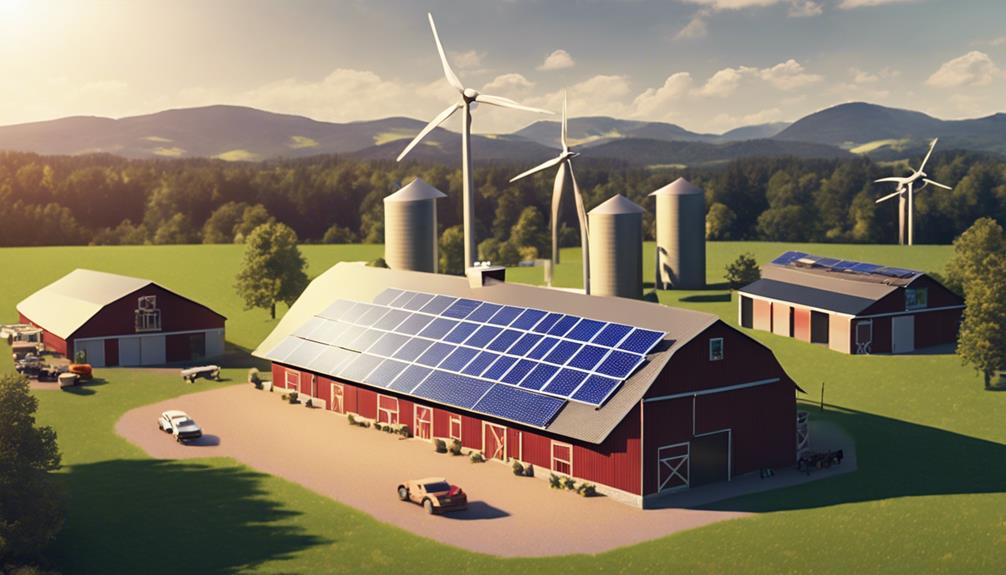Seven Key Practices for Sustainable Horse Farming
Did you know that a single horse can produce about 50 pounds of manure per day?
Implementing sustainable practices on your horse farm is not only environmentally responsible but can also benefit your operation in the long run.
From rotational grazing to promoting biodiversity, these seven key practices can help you create a healthier and more sustainable environment for your horses.
By following these guidelines, you can ensure the well-being of your animals while minimizing your farm's impact on the surrounding ecosystem.
Implement Rotational Grazing Systems
To improve pasture health and maximize forage utilization, consider implementing rotational grazing systems on your horse farm. This type of grazing management involves dividing your pastures into smaller sections or paddocks and rotating your horses between them. By doing so, you allow the vegetation in each paddock to recover while the horses graze in another area. This practice not only benefits the soil fertility by preventing overgrazing but also promotes healthier grass growth and reduces the risk of parasite infestation in your horses.
Effective grazing management is crucial for maintaining soil fertility on your horse farm. Overgrazing can deplete the pasture of essential nutrients, leading to poor forage quality and bare patches in the pasture. Rotational grazing helps to address this issue by giving the grass time to regrow and replenish its nutrient stores. Additionally, the rotational system allows for more efficient utilization of the available forage, ensuring that your horses have access to fresh and nutritious grass throughout the grazing season.
Manage Manure Wisely
Managing manure properly is essential for maintaining a healthy and sustainable horse farm environment. By implementing effective composting techniques, you can efficiently manage the manure produced by your horses. Composting not only helps in waste reduction but also produces nutrient-rich organic material that can be used to enhance soil fertility on your farm.
When composting horse manure, it's crucial to create the right balance of green (nitrogen-rich) and brown (carbon-rich) materials. This balance ensures proper decomposition and prevents the accumulation of harmful pathogens. Regularly turning the compost pile helps aerate the mixture, speeding up the decomposition process.
Additionally, nutrient management is vital when dealing with horse manure. Understanding the nutrient content of the manure allows you to make informed decisions about its application on pastures or fields. By testing the manure for nitrogen, phosphorus, and potassium levels, you can avoid overloading the soil with excess nutrients, which can lead to environmental pollution.
Proper management of manure through composting techniques and nutrient testing not only benefits your farm but also contributes to sustainable agricultural practices. By recycling valuable nutrients and reducing waste, you can create a more environmentally friendly horse farm while improving soil health and productivity.
Utilize Natural Pest Control Methods
For effective pest control on your horse farm, consider implementing natural methods that promote a healthy ecosystem. One way to naturally control pests is by encouraging the presence of natural predators. These can include animals like certain bird species, ladybugs, or even beneficial insects like parasitic wasps. By creating habitats that attract these predators, you can help keep pest populations in check without the need for chemical interventions.
Another effective natural pest control method is companion planting. This involves planting certain crops or flowers together that benefit each other in various ways. For example, planting marigolds around your horse pastures can help deter pests like flies due to their strong scent. Similarly, planting herbs like mint or lavender can also act as natural repellents for insects while providing additional benefits such as fragrance or even potential medicinal uses.
Conserve Water Resources
Consider implementing water conservation practices on your horse farm to ensure sustainable usage and reduce waste. Conserving water resources is crucial for the environment and can also lead to cost savings for your farm. To achieve this, focus on improving irrigation efficiency and reducing water wastage. Here are some key practices to help you conserve water effectively:
- Install a rainwater harvesting system: Capture rainwater from your barn's roof and store it in tanks for later use in watering pastures or arenas. This reduces the reliance on freshwater sources for irrigation.
- Utilize drip irrigation: Drip irrigation delivers water directly to the roots of plants, minimizing evaporation and runoff. This targeted approach ensures efficient water usage and healthier vegetation.
- Implement water recycling systems: Set up systems to recycle water from activities like washing horses or equipment. This recycled water can then be repurposed for non-potable uses around the farm.
- Monitor and maintain irrigation equipment: Regularly check for leaks, adjust sprinklers to avoid watering non-essential areas, and invest in water-efficient irrigation systems to optimize water usage.
Opt for Sustainable Feed Practices
To promote sustainability on your horse farm, prioritize opting for sustainable feed practices. When it comes to feed sourcing, choose suppliers that offer locally grown and organic feeds. This not only supports your local economy but also reduces the environmental impact of transporting feed long distances. Look for feeds that are free from genetically modified organisms (GMOs) and produced in ways that minimize pesticide and chemical fertilizer use.
In addition to mindful sourcing, focus on waste reduction in your feed management. Implement a feeding plan that minimizes leftovers and spoilage. Ensure that you're providing your horses with the right amount of feed to prevent overeating and wasted resources. Proper storage of feed in airtight containers can also prevent spoilage and contamination, reducing the need to discard feed due to damage.
Consider establishing relationships with local farmers or co-ops to explore options for utilizing surplus produce or grains that aren't suitable for human consumption as feed for your horses. This practice not only reduces waste but also fosters community connections and promotes a circular economy within your local area.
Maintain Pasture Health
Maintaining pasture health is crucial for ensuring the well-being of your horses and the sustainability of your farm. To achieve this, you must pay close attention to soil fertility and weed management. Here are some key practices to help you maintain healthy pastures:
- Regular Soil Testing: Conduct soil tests at least once a year to assess nutrient levels and pH. This information will guide you in applying the correct fertilizers to improve soil fertility and promote healthy pasture growth.
- Rotational Grazing: Implement rotational grazing practices to prevent overgrazing and allow pastures to recover. This method also helps distribute manure more evenly, contributing to soil health.
- Weed Identification and Control: Regularly inspect your pastures for weeds and invasive plants. Implement an effective weed management plan, which may include manual removal, mowing, or targeted herbicide application.
- Proper Watering: Ensure adequate water sources in pastures to maintain optimal plant health. Proper hydration is essential for the growth of grass and helps prevent weed encroachment.
Reduce Energy Consumption

To decrease energy usage on your horse farm, assess equipment efficiency and implement energy-saving practices. Start by evaluating your current lighting system. Consider switching to energy-efficient lighting options such as LED bulbs. These bulbs consume less energy and have a longer lifespan than traditional incandescent bulbs, reducing both your electricity usage and replacement costs.
Another great way to reduce your farm's energy consumption is by installing solar panels. Solar panels harness the power of the sun to generate electricity, providing a renewable and sustainable energy source for your operations. While the initial investment may be significant, the long-term savings on your energy bills can make it a worthwhile venture.
Additionally, ensure that your farm equipment is well-maintained and operating efficiently. Regular maintenance checks can help identify any issues that may be causing unnecessary energy wastage. Simple practices such as keeping machinery clean and properly lubricated can improve their performance and reduce energy consumption.
Promote Biodiversity on Farm
Consider enhancing the ecological balance on your horse farm by actively promoting biodiversity within your operations. Biodiversity plays a crucial role in creating a sustainable and thriving environment for both your horses and the surrounding ecosystem. Here are some key practices to help you promote biodiversity on your farm:
- Plant Native Vegetation: By incorporating native plants into your farm's landscape, you can provide food and shelter for local wildlife while also restoring the natural habitat that may have been disrupted.
- Create Wildlife Habitats: Designate areas on your farm specifically for attracting wildlife, such as building birdhouses, installing bat boxes, or setting up pollinator gardens. These habitats can encourage a diverse range of species to visit and inhabit your farm.
- Implement Water Features: Ponds or small water bodies can attract a variety of wildlife, including amphibians, birds, and insects. Ensure these water features are designed to support local species and provide a source of hydration for wildlife.
- Practice Habitat Restoration: If your farm has areas that have been degraded or disturbed, consider implementing habitat restoration projects to revive these spaces. This could involve reseeding native plants, removing invasive species, or restoring wetlands to enhance biodiversity.
Frequently Asked Questions
How Can Horse Farmers Effectively Manage the Environmental Impact of Horse Waste in Addition to Manure Management Practices?
To manage the environmental impact of horse waste effectively, consider using composting toilets for human waste and adopting nutrient recycling practices. Additionally, implement solar panels to boost energy efficiency on your farm.
These strategies help minimize the ecological footprint of horse farming and promote sustainability. By incorporating these methods into your waste management and energy usage, you can contribute to a greener and more environmentally friendly operation.
What Are Some Innovative Ways to Reduce Water Consumption on Horse Farms Beyond Simple Conservation Methods?
To reduce water consumption on horse farms, consider using smart irrigation systems that monitor soil moisture levels and only water when necessary.
Additionally, explore greywater recycling options to reuse water from sources like horse wash stalls for non-potable purposes.
These innovative methods go beyond basic conservation practices and can help you manage water resources more efficiently while caring for your horses and the environment.
Are There Any Specific Natural Pest Control Methods That Are Particularly Effective for Controlling Pests on Horse Farms?
When dealing with pests on horse farms, natural predators like ladybugs and praying mantises can be highly effective in controlling populations.
Additionally, companion planting certain herbs like lavender, mint, or marigolds can help repel insects that are harmful to horses.
How Can Horse Farmers Ensure That the Feed They Are Using Is Sustainably Sourced and Environmentally Friendly?
To ensure your horse farm's feed is sustainably sourced and environmentally friendly, start by researching suppliers who prioritize eco-friendly practices. Look for feeds made from locally sourced ingredients to reduce transportation emissions. Consider organic options to support sustainable agriculture. Additionally, check for certifications like Non-GMO Project Verified or USDA Organic to guarantee the feed meets certain standards.
What Are Some Practical Ways to Promote Biodiversity on a Horse Farm Beyond Just Planting Native Plants and Trees?
To promote biodiversity on your horse farm, think beyond just planting native plants and trees. Consider creating pollinator habitats to support bees and butterflies. Implement grazing rotation to allow vegetation to regenerate naturally.
Install composting toilets to reduce water pollution and promote healthy soil. Utilize rainwater harvesting to conserve water resources and support diverse ecosystems.
These practices can enhance biodiversity and sustainability on your horse farm.
Conclusion
In conclusion, by implementing these seven key practices for sustainable horse farming, you can ensure the health and well-being of your horses, while also reducing your environmental impact. Rotational grazing, managing manure, utilizing natural pest control, conserving water, sustainable feeding, maintaining pasture health, reducing energy consumption, and promoting biodiversity are all essential steps towards creating a more sustainable and eco-friendly farm for your horses.
Start implementing these practices today to make a positive impact on the environment and your horse farming operation.
